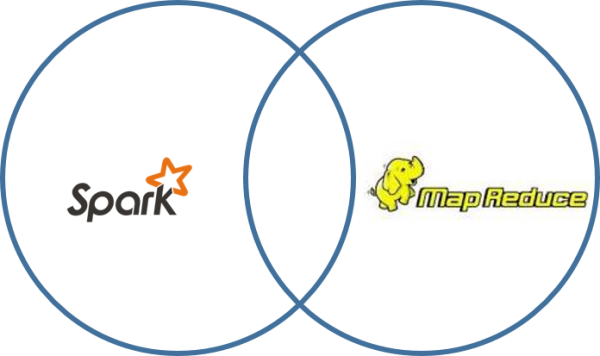Big Data is one of the enabling technologies for companies to digitally transform either their operations and/or customer interactions. However the open source world can be complicated, especially in the red hot Big Data arena. There are a myriad of technologies; some compete with one another, others overlap, some are complementary, and worse of all, some technologies both compete and are complementary (e.g. Cassandra can stand alone or run on top of Hadoop, thus it competes, and it is complementary.)
(e.g. Cassandra can stand alone or run on top of Hadoop, thus it competes, and it is complementary.)
Like a Venn diagram, both Spark and MapReduce can coexist, but a number of their use cases do overlap. (Read more about Spark vs. Hadoop here). On Monday IBM, announced that it was throwing its weight behind Spark (see my blog post here) with little mention of Hadoop. It is easy to see how companies can one can feel like Dorothy in the Land of Oz. However, following a few simple recommendations a company can make good decisions in this seeming fantastical world (view my blog post here).
There is more good news. In this new digital, Big Data ecosystem the technology is pretty pluggable and is becoming more interchangeable. If the focus is on business value that data and analytics can bring to a company undergoing a digital transformation, then a good pragmatic business decision today will result in a good return on your technology investment.

What are your thoughts on the differences between what’s considered digital transformation, vs. digital marketing and strategy? It seems to me like this is all semantics more than anything. As for tactics though, I feel like true digital transformation is turing a business from the old means in infrastructure and land server based business units to building cloud based infrastructures and constructing a digital business model that’s able to pivot and be agile as business change more quickly. Thoughts?
Digital Marketing refers to just leveraging digital channels (e.g. web pages) for communicating your marketing message. Digital Transformation is much broader, and refers the holistic change that an entire business undergoes when it decides to leverage digital technologies. For instance, a few years back Chevron started to use Big Data analytics to evaluate sensor and sonic data to optimize their drilling efforts and oil production. Yes, to you your point this effort by Chevron required a changed technology infrastructure. However, processes had to be changed to incorporate the conclusions of the analytics into the drilling process. People then needed to be trained to leveraged these new processes. There was also a cultural change needed to instead of relying on legacy methods to optimize drilling, Chevron’s employees now had to trust this new data. Digital transformation is much bigger than a technology infrastructure – it really changes many significant aspects of a business.